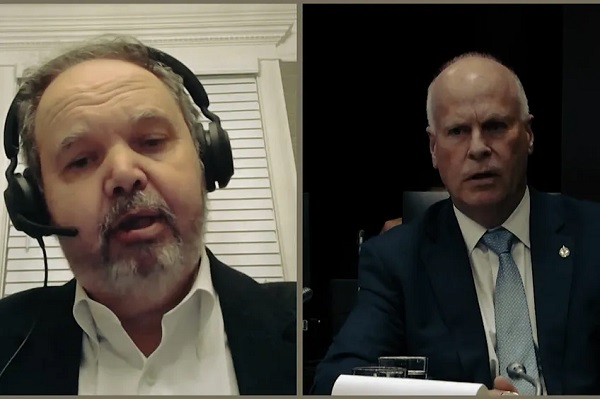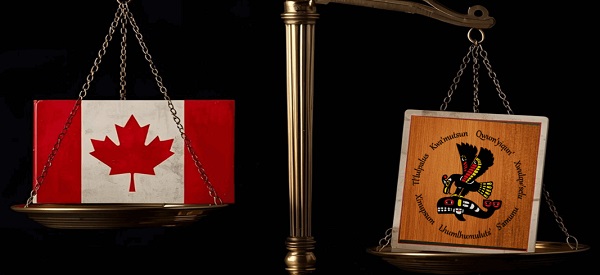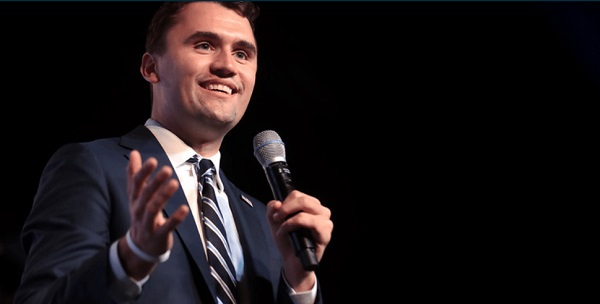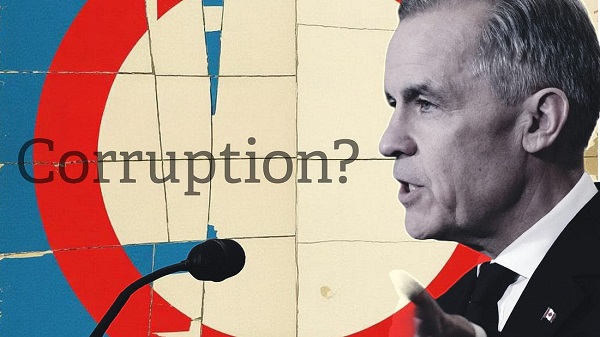Business
Green Energy or Green Grift? SDTC at the Center of a $38 Million Scandal

The Auditor General’s report reveals millions in taxpayer funds funneled to insiders, with government officials shrugging off responsibility. Andrew Noseworthy’s testimony in PCAP
Conflicts of Interest, Negligence, and Liberal Mismanagement Unveiled
In yet another stunning display of Liberal mismanagement, Sustainable Development Technology Canada (SDTC) has found itself at the center of a growing scandal. The Auditor General’s recent report revealed systemic conflicts of interest and gross negligence in handling taxpayer money—conflicts that funneled millions of dollars to companies connected to SDTC board members.
The controversy reached new heights during a heated Public Accounts Committee meeting, where Andrew Noseworthy, a former assistant deputy minister, was grilled over his role as the government’s “eyes and ears” on the SDTC board. His testimony wasn’t just underwhelming—it was a masterclass in buck-passing.
Here’s Andrew Noseworthy’s opening statement, boiled down: “I was there, but I wasn’t responsible. I saw things, but I didn’t do anything about them. It wasn’t my job to actually oversee anything, and even though I was supposed to be the government’s eyes and ears, somehow, I missed all the obvious corruption right in front of me.”
Are you kidding me? This guy sat in board meetings where millions of dollars—your tax dollars—were being funneled to companies with clear, blatant conflicts of interest. He says, “I wasn’t a decision-maker, I was just an observer.” Observer of what? A train wreck of mismanagement? The deputy minister calls him the “eyes and ears” on the board, and yet he’s playing dumb when asked about conflicts of interest that were declared, minuted, and repeatedly ignored.
But wait—it gets better. When pressed about COVID-19 relief payments—$38 million handed out like party favors—he just shrugs and says there was “urgency.” Urgency to do what? Bail out friends and allies under the guise of saving the clean tech sector? No proper due diligence, no accountability. Just money flying out the door to keep the Trudeau administration’s cronies happy.
And this guy wants us to believe he wasn’t complicit? That he had no responsibility? The buck stops nowhere, apparently—not with Noseworthy, not with SDTC, not with the Liberal government that created this green slush fund in the first place.
This is exactly what you get with Trudeau’s “green energy” initiatives. It’s not about the environment; it’s about lining the pockets of insiders and calling it progress. Canadians deserve better. But under Trudeau, this is just another day in the swamp.
Now let’s get into the Public Accounts Committee’s Meeting 145, starting with Rick Perkins and his fiery takedown of this shameless display of negligence. Buckle up, folks, because it only gets worse from here.
Rick Perkins Exposes Liberal Rot
Here’s the scene: Conservative MP Rick Perkins goes on the offensive, trying to get a straight answer out of Andrew Noseworthy. And what does he find? A human shrug emoji. Noseworthy, the so-called “eyes and ears” of the Deputy Minister at SDTC, claims he sat in meetings, watched directors funnel taxpayer money into their own companies, and thought, “Not my problem!”
Perkins doesn’t let up. He reads the SDTC Act aloud: “No director shall profit or gain any income.” It’s not rocket science, folks. It’s the law. But Noseworthy’s excuse? He didn’t have an “independent way” of assessing conflicts of interest. What?! The conflicts were declared in the meetings! The minutes even said, “Here’s who’s conflicted. Here’s who’s getting millions of dollars.” Yet Noseworthy insists he couldn’t connect the dots.
Then Perkins drops the hammer. He points to André-Lise Mato, a Liberal insider who raked in $10.4 million for companies she’s connected to—all in direct violation of the SDTC Act. And what does Noseworthy say? He assumed recusal was enough. Recusal! As if stepping out of the room while your cronies vote to line your pockets somehow makes it okay.
But the pièce de résistance is when Perkins asks Noseworthy the million-dollar question: “Who are you covering up for?” And what does Noseworthy do? He throws up his hands and says he didn’t know it was his job to report conflicts. His job was apparently to sit there and watch taxpayer dollars burn while doing nothing.
Here’s the bottom line: This isn’t oversight—it’s willful negligence. Noseworthy didn’t miss the corruption; he just didn’t care.
Liberal Damage Control: Valarie Bradford Plays Defense
After Rick Perkins rips Andrew Noseworthy apart for his role in enabling millions of taxpayer dollars to be funneled into the pockets of Liberal insiders, here comes Valarie Bradford—stepping in with a velvet glove to do damage control. And folks, it’s laughable.
Instead of holding Noseworthy accountable, Bradford throws him a lifeline. She asks him to—what?—clarify his role again? As if we haven’t heard it already. Noseworthy, ever the bureaucrat, drones on about “policy coordination” and how he wasn’t there to actually do anything, just to… exist, apparently.
And then Bradford takes it a step further. She asks him about the conflict of interest process. Noseworthy assures her, “Oh, don’t worry, board members declared their conflicts and left the room.” Oh, really? They declared their conflicts before approving millions of dollars for their own companies? And that’s fine because they recused themselves? What kind of clown world are we living in where this is acceptable?
But Bradford doesn’t press him. Nope, instead, she shifts the focus to COVID-19. According to Noseworthy, the clean tech sector was in a “state of crisis.” Markets collapsing, capital drying up, supply chains falling apart—it’s the same sob story they always trot out to justify throwing taxpayer money out the window. What he doesn’t mention? That $38 million in COVID-19 funds went out with no proper oversight or accountability. Were they saving the sector or just padding their friends’ pockets?
And then, the cherry on top: Bradford asks Noseworthy to wax poetic about Canada’s “potential” in the clean tech sector. Of course, Noseworthy obliges, talking about how promising the industry is and how Canada can be a global leader. Sure, it’s easy to sound optimistic when you’ve just described how billions of dollars are wasted propping up a system riddled with corruption.
Here’s the truth: This wasn’t a real line of questioning. It was a performance—an attempt to clean up the mess Perkins just exposed. Bradford wasn’t there to get answers. She was there to protect the Liberals’ green slush fund and keep the gravy train running. It’s not accountability; it’s theater.
Bloc Asks the $38 Million dollar question
Bloc MP Nathalie Sinclair-Desgagné took Noseworthy to task, and folks, it wasn’t pretty. She grilled him on the $38 million in COVID-19 payments that SDTC threw around like Monopoly money, completely outside the rules of their contribution agreements. And Noseworthy? He admitted he knew these payments didn’t comply. But don’t worry, he flagged it to the Deputy Minister. And then what? Nothing. Just more hand-wringing about how it wasn’t his job to actually enforce the rules.
But Sinclair-Desgagné didn’t let him off the hook. She drove home the point that Noseworthy’s entire salary—paid for by taxpayers—was supposed to fund oversight and accountability. Instead, we got a guy sitting in meetings, nodding along, and then shrugging when asked about the massive breaches happening under his nose.
And let’s talk about that bioreactor project she brought up. A piece of equipment worth $6.2 million somehow ended up costing over $8 million—an extra couple million dollars that just poof! disappeared into the ether. When pressed, Noseworthy said, “Oh, I didn’t know the financing details.” Of course not. That would require actually doing his job.
Here’s the kicker: Sinclair-Desgagné asked the hard question everyone’s thinking—“How could you, as a public servant, let taxpayers get ripped off like this?” And Noseworthy’s answer was the same tired song and dance: “It wasn’t my responsibility.”
Let’s be honest. This guy wasn’t a watchdog. He was a lapdog, sitting there to give the appearance of oversight while turning a blind eye to corruption. Taxpayer dollars were wasted, contribution agreements were ignored, and Noseworthy’s excuse? “Not my job.”
Sinclair-Desgagné nailed it: Canadians pay public servants like Noseworthy to protect their interests, not to act as human rubber stamps for Trudeau’s green slush fund. But instead, we’re left with millions of dollars missing, projects overinflated, and a government official who thinks shrugging is a valid defense.
NDP’s Missed Opportunity: Softball Questions Fall Short
Richard Cannings, the NDP’s mild-mannered investigator, gently tiptoeing around the real issues. Instead of holding Andrew Noseworthy’s feet to the fire, Cannings basically hands him a pillow. “Could you kindly explain your role again?” Really? How many times does Noseworthy have to repeat the same nonsense before people realize it’s a dodge?
Noseworthy again plays the broken record: “I wasn’t responsible. I didn’t have oversight. I was just there for policy coordination.” Sure, because policy coordination is what taxpayers are worried about when $38 million is being funneled into friends’ pockets during the COVID-19 “crisis.”
And then Cannings digs into conflicts of interest, asking if board members who declared conflicts actually stayed for discussions or left the room. Noseworthy assures him, “Oh, they usually recused themselves.” Usually? That’s reassuring! But the real kicker? Noseworthy claims he never witnessed violations. Never. Despite the Auditor General uncovering 186 conflicts, Noseworthy saw nothing. Blind? Or just complicit?
But wait—it gets better. Cannings asks about the process for approving projects. Noseworthy proudly describes a system where the Project Review Committee does all the heavy lifting and the board just rubber-stamps their work. Cannings doesn’t even challenge him on the obvious: if this committee is the gatekeeper, where’s the oversight? Who’s accountable? Clearly not Noseworthy.
And then we get to the $38 million in COVID-19 payments, the scandal at the heart of all this. Does Cannings press Noseworthy on the illegality of handing out taxpayer money without following contribution agreements? Nope. Instead, he lets Noseworthy ramble on about the “urgency” of the pandemic as if that justifies blatant mismanagement.
Here’s the truth: Cannings had a chance to demand answers, but instead, he gave Noseworthy the opportunity to spin the same excuses we’ve heard for 30 minutes. “I didn’t know.” “It wasn’t my job.” Give me a break. This isn’t accountability; it’s a softball game.
Taxpayers deserve better. They deserve someone who will actually stand up and say, “This is corruption, plain and simple.” But instead, we get Cannings politely nodding along while the Liberals laugh all the way to the bank. This is why Canadians are so frustrated with government—it’s all talk, no action.
Conservative Michael Cooper Turns Up the Heat
Michael Cooper didn’t just ask Andrew Noseworthy questions—he eviscerated him. If Rick Perkins set the tone, Cooper turned the heat all the way up. And the question at the heart of this whole fiasco? “How could you sit through board meetings where directors blatantly violated the SDTC Act and say nothing?”
Cooper pulled no punches. He read section 12 of the SDTC Act aloud: “No director shall profit or gain any income.” It’s crystal clear, right? But then there’s André-Lise Mato—an SDTC board member—walking away with $10.4 million for her companies. That’s not a conflict of interest, folks. That’s a crime.
And what does Noseworthy say? Oh, “I assumed recusals were enough.” Really? Since when does stepping out of the room magically erase the fact that you’re breaking the law? Cooper wasn’t buying it, and neither should Canadians.
But wait—it gets worse. Noseworthy claims it wasn’t his job to report these violations, even though he was literally the Deputy Minister’s “eyes and ears” at SDTC. What was his job, then? Warming a chair? Collecting a paycheck? Because it sure wasn’t holding anyone accountable.
Here’s the truth: Noseworthy wasn’t just complicit; he was an enabler. He sat there, meeting after meeting, watching millions of taxpayer dollars flow into the hands of Liberal insiders. And when pressed on why he didn’t do anything, his defense is essentially, “It wasn’t my problem.”
Cooper nailed it. This isn’t just bureaucratic incompetence; it’s systemic corruption. The SDTC Act was broken. Taxpayer money was stolen. And Noseworthy sat there, twiddling his thumbs, while the Liberals ran their green energy slush fund like a cash cow for their friends.
Kelly McCauley’s Exposé: The Buck Stops Nowhere
Kelly McCauley followed up with Cooper and he wasn’t there to play games, folks. He walked in with the facts, and he left no room for excuses. For six straight minutes, McCauley dismantled Andrew Noseworthy’s entire defense, piece by piece, and what did we learn? That the buck doesn’t stop anywhere in Trudeau’s government.
First, McCauley establishes the obvious: Noseworthy worked closely with the Deputy Minister for years. They had meetings, they had conversations, but somehow, Noseworthy never thought to mention the glaring conflicts of interest happening right in front of him. Why? Because he “didn’t think it was his job.” Of course not! Why do your job when you can just collect a paycheck and look the other way?
Then McCauley goes for the jugular. He asks why Noseworthy didn’t report these conflicts to the Minister, as required by Article 20.03 of the contribution agreement. And what does Noseworthy say? “Oh, I assumed the board was handling it.” Right. The same board handing out millions of dollars to its own members was “handling” the conflicts. That’s like letting the fox guard the henhouse and then acting surprised when feathers are flying.
And let’s not forget the whistleblower. A lower-level public servant had the courage to come forward and expose the rot at SDTC. But Noseworthy? The Deputy Minister’s “eyes and ears”? He sat in the room, watched the corruption unfold, and did absolutely nothing. McCauley makes it clear: this isn’t just incompetence—it’s a complete failure of accountability.
But here’s the real kicker: Noseworthy keeps saying, “It wasn’t my role.” Not his role to oversee conflicts. Not his role to report violations. Not his role to ensure taxpayers’ money wasn’t being flushed down the drain. So, what was his role? To show up and nod along while Trudeau’s Liberal insiders cashed in?
McCauley’s cross-examination exposes the truth about this government: no one takes responsibility because the system is designed to protect the corrupt. Millions of dollars, your dollars, are gone. And Noseworthy? He’s not apologizing. He’s not taking ownership. He’s passing the buck like it’s an Olympic sport.
This is Trudeau’s Canada, folks. A government where “accountability” is a dirty word, and taxpayer money is a slush fund for insiders. McCauley pulled back the curtain, but unless people like Noseworthy are held accountable, the swamp isn’t draining anytime soon.
Final Verdict: A Government Designed to Protect Corruption
What was this guy’s job? I’ll tell you what his job was: to be a useful idiot for the board. That’s it. A rubber-stamp figurehead who sat in the room to give the illusion of oversight. “Look, we have checks and balances!” they’d say. But in reality, Noseworthy’s only responsibility was to collect his taxpayer-funded paycheck and look the other way while corruption ran wild.
Let’s be clear: It doesn’t take a Ph.D., a law degree, or even a high school diploma to know that when taxpayer dollars are being funneled into board members’ pockets, you REPORT IT. You stand up and say, “This is wrong!” But not Noseworthy. Nope, he just shrugged, collected his salary, and moved on. Why? Because that’s the system—designed by Trudeau’s Liberals to enable the swamp to thrive.
This guy sat through meetings where conflicts of interest were openly discussed. He saw money being handed out like candy to insiders, and his excuse is, “Well, I didn’t think it was my job.” Really? Then why were you there? Why did Canadians pay for your salary, your benefits, your pension, if you weren’t going to do the bare minimum and speak up?
Let me say it plainly: This guy needs to be charged. The SDTC Act was broken—repeatedly—and he was complicit. He may not have pocketed the money himself, but he enabled the system that let it happen. And as a taxpayer, I want every single dollar that went to him reimbursed.
Because here’s the reality: This isn’t just about Andrew Noseworthy. This is about a government that has normalized corruption, where accountability is dead, and where public servants think their only job is to protect the Liberal swamp. Canadians deserve better. And it starts by holding people like Noseworthy accountable—because if we don’t, the message is clear: corruption pays.
Subscribe to The Opposition with Dan Knight .
For the full experience, upgrade your subscription.
Business
Judges are Remaking Constitutional Law, Not Applying it – and Canadians’ Property Rights are Part of the Collateral Damage

By Peter Best
The worst thing that can happen to a property owner isn’t a flood or a leaky foundation. It’s learning that you don’t own your property – that an Aboriginal band does. This summer’s Cowichan Tribes v. Canada decision presented property owners in Richmond B.C. with exactly that horrible reality, awarding Aboriginal
title to numerous properties, private and governmental, situated within a large portion of Richmond’s Fraser River riverfront area, to Vancouver Island’s
Cowichan Tribes. For more than 150 years, these properties had been owned privately or by the government. The Cowichan Tribes had never permanently lived
there.
But B.C. Supreme Court Justice Barbara Young ruled that because the lands had never been formally surrendered by the Cowichans to the Crown by treaty, (there
were no land-surrender treaties for most of B.C.), the first Crown grants to the first settlers were in effect null and void and thus all subsequent transfers down
the chain of title to the present owners were defective and invalid.
The court ordered negotiations to “reconcile” Cowichan Aboriginal title with the interests of the current owners and governments. The estimated value of the
property and government infrastructure at stake is $100 billion.
This ruling, together with previous Supreme Court of Canada rulings in favour of the concept of Aboriginal title, vapourizes more than 150 years of legitimate
ownership and more broadly, threatens every land title in most of the rest of B.C. and in any other area in Canada not subject to a clear Aboriginal land surrender
treaty.
Behind this decision lies a revolution – one being waged not in the streets but in the courts.
In recent years Canadian judges, inspired and led by the Supreme Court of Canada, have become increasingly activist in favour of Aboriginal rights, in effect
unilaterally amending our constitutional order, without public or legislative input, to invent the “consult and accommodate” obligation, decree Aboriginal title and grant Canadian Aboriginal rights to American Indians. No consideration of the separation of powers doctrine or the national interest has ever been evidenced by
the Court in this regard.
Following the Supreme Court’s lead, Canadian judges have increasingly embraced the rhetoric of Aboriginal activism over restrained, neutral language, thus
sacrificing their need to appear to be impartial at all times.
In the Cowichan case the judge refused to use the constitutional and statutory term “Indian,” calling it harmful, thereby substituting her discretion for that of our
legislatures. She thanked Aboriginal witnesses with the word “Huychq’u”, which she omitted to translate for the benefit of others reading her decision. She didn’t
thank any Crown witnesses.
What seems like courtesy in in fact part of a larger pattern: judges in Aboriginal rights cases appearing to adopt the idiom, symbolism and worldview of the
Aboriginal litigant. From eagle staffs in the courtroom, to required participation in sweat lodge ceremonies, as in the Supreme Court-approved Restoule decision,
Canada’s justice system has drifted from impartial adjudication toward the appearance of ritualized, Aboriginal-cause solidarity.
The pivot began with the Supreme Court’s 1997 Delgamuukw v. British Columbia decision, which first accepted Aboriginal “oral tradition” hearsay evidence. Chief
Justice Lamer candidly asked in effect, “How can Aboriginals otherwise prove their case?” And with that question centuries of evidentiary safeguards intended
to ensure reliability vanished.
In Cowichan Justice Young acknowledged that oral tradition hearsay can be “subjective” and is often “not focused on establishing objective truth”, yet she
based much of her ruling on precisely such “evidence”.
The result: inherently unreliable hearsay elevated to gospel, speculation hardened into Aboriginal title, catastrophe caused to Richmond private and government property owners, the entire land titles systems of Canadian non-treaty areas undermined, and Crown sovereignty, the fount and source of all real property rights generally, further undermined.
Peter Best is a retired lawyer living in Sudbury, Ontario.
The original, full-length version of this article was recently published in C2C Journal.
Business
Trump Blocks UN’s Back Door Carbon Tax


From the Daily Caller News Foundation
Has the time come for America to seriously reassess its participation in and support for the United Nations (U.N.)?
It’s a question that some prominent people are asking this week after the increasingly woke and essentially useless globalist body attempted to sneak a global carbon tax in through the back door while no one was looking.
Except someone was looking, as it turns out. Republican Utah Sen. Mike Lee, who chairs the powerful Senate Energy and Natural Resources Committee and is part of the majority on both the Senate Judiciary and Senate Foreign Relations Committees, said in an X post Thursday evening that this latest bit of anti-American action “warrants our withdrawal from the UN.”
Dear Readers:
As a nonprofit, we are dependent on the generosity of our readers.
Please consider making a small donation of any amount here.
Thank you!
Secretary of State Marco Rubio said in his own X post on the matter on Wednesday that the Trump administration “will not allow the UN to tax American citizens and companies. Under the leadership of POTUS (President Donald Trump), the U.S. will be a hard NO. We call on other nations to stand alongside the United States in defense of our citizens and sovereignty.”
On Friday afternoon, Mr. Rubio took to X again to announce the news that efforts by himself and others in the Trump administration succeeded in killing an effort to move the tax forward during a meeting in London. However, the proposal is not fully dead – a final vote on it was simply delayed for a year.
The issue at hand stems from an attempt by the International Maritime Organization (IMO) – an agency of the U.N. – to impose net-zero rules on fuels used for seaborne shipping operations. The Trump administration estimates the imposition of the new requirements will increase the cost of shipping goods by about 10%, thus creating yet another round of inflation hitting the poorest citizens the hardest thanks to the globalist obsession with the amount of plant food – carbon dioxide – in the atmosphere.
Known as the IMO Net-Zero Framework, the proposal claims it would effectively “zero out” emissions from the shipping industry by 2050.
The potential implications if the U.N. ultimately succeeds in implementing its own global carbon tax are obvious. If this unelected, unaccountable globalist body can levy a carbon tax on Americans, a concept that America’s own elected officials have steadfastly rejected across the terms of the last five U.S. presidents, what would then prevent it from imposing other kinds of taxes on the world to support its ideological goals?
President Trump’s opposition to exactly this kind of international intrusion into America’s domestic policy choices is the reason why he has twice won the presidency, each time de-committing the U.S. from the Paris Climate Accords.
It has become increasingly obvious in recent years that the central goal of the global climate alarm movement is to dramatically raise the cost of all kinds of energy in order to force the masses to live smaller, more restricted lives and make their behavior easier for authoritarian governments to control. This camel’s nose under the tent move by the U.N. to sneak a global carbon tax into reality is just the latest in a long parade of examples that serve as proof points for that thesis.
At some point, U.S. officials must seriously reassess the value proposition in continuing to spend billions of dollars each year supporting and hosting a globalist organization whose every action seems designed to inflict damage on our country and its people. Now would be a good time to do that, in fact.
David Blackmon is an energy writer and consultant based in Texas. He spent 40 years in the oil and gas business, where he specialized in public policy and communications.
-

 Red Deer2 days ago
Red Deer2 days agoThe City of Red Deer’s Financial Troubles: Here Are The Candidates I Am Voting For And Why.
-

 Business1 day ago
Business1 day agoUN, Gates Foundation push for digital ID across 50 nations by 2028
-

 COVID-191 day ago
COVID-191 day agoThe Trials of Liberty: What the Truckers Taught Canada About Power and Protest
-

 C2C Journal1 day ago
C2C Journal1 day agoCharlie Kirk and the Fragility of Civic Peace
-

 International23 hours ago
International23 hours agoPoland’s president signs new zero income tax law for parents with two children
-

 Business2 days ago
Business2 days agoFederal Budget 2025: A responsible media would ensure Canadians know about the dismal state of federal finance
-

 Business2 days ago
Business2 days agoCanada has an energy edge, why won’t Ottawa use it?
-

 Business2 days ago
Business2 days agoEthics on Ice: See You Next Year







